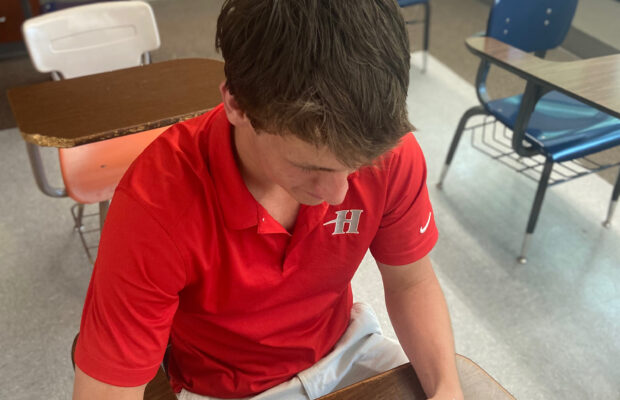Assigned reading. For most students, it is a long, arduous, and boring task. In a generation surrounded by technology and social media, many teenagers would say there are much better ways to invest their time than to read. However, this school is different.
For as long as most students, past and present, can remember, the “outside reading” program has been a foundation for the education at the school. Sons that are students now are reading some of the same books that their fathers have read when they were at the school. Why is it important to read the outside reading books? There are many beneficial aspects to it.
When it comes to picking the books that are put on the outside reading list, it is a very simple and organized process. “We [the English teachers] choose it,” said Mr. Edward Dodge, senior English teacher. “There are several [factors when choosing the books]. A lot of the books, we’ve had on the list for quite some time. In some cases, Father Tribou selected the books. But primarily, the factors are varied, and they alter a little bit depending on grade level.
“For the freshmen year, we want a combination of books that are readable, fun, and will attract the attention of the students,” said Mr. Dodge. “So you’re going to get Agatha Christie’s And Then There Were None. But you’re also going to get William Golding’s Lord of the Flies and [John] Steinbeck’s Of Mice and Men. So that’s kind of the angle for freshman and sophomore year.
“When you get to junior and senior year, the emphasis is more on what we would call ‘canon,’” said Mr. Dodge. “Books that are culturally important. With American literature [in junior year], there is more of a focus on American writers. With British literature [in senior year], it’s half British writers and half world authors, but all of them are canon for western culture.”
For many of the books on the outside reading list, there are quite a few that some might consider “controversial.” There is a reason why these books have made the list. “We better explain [those books],” said Father Patrick Friend, freshman English teacher. “Because to not say anything about it might give an implicit nod of approval. That’s clearly not why we choose them. In many ways, these books are like lightning rods because they are so pivotal and important. It would be a really simplistic reading to see [only] the controversial aspect.”
With many controversial books on the outside reading list, many would suspect that parents might oppose their sons reading them. However, that is not true. “I’ve been teaching the same book list for a very long time,” said Mr. Dodge. “I’ve never had any complaints. There might have been, like 20 years ago, some questions about The Catcher in the Rye. But it is obviously important for canon, and Fr. Tribou put it on the book list.”
J.D. Salinger’s The Catcher in the Rye has been a favorite outside reading book for some students. “I’ve really enjoyed [it],” said junior Elias Found. “It’s mainly for the fact that I’ve been able to laugh and sympathize with Holden, [the protagonist], but I’ve also really enjoyed talking about the book in class, discussing Holden and his loss of innocence.”
With all the books on the outside reading list, it might be a while before major changes come. “Significantly, I don’t perceive [the list will change] in the near future,” said Mr. Dodge. “I think there are some tweaks that we can do here and there. It’s a balancing act because, on the one hand, you don’t want to just toss a book out because it’s challenging. On the other hand, if students are not consistently reading it, year after year, and if you as a teacher have tried to alter your approach to entice it, and it’s not changing, it might be worth considering trying to find a similar text. But I don’t think we’re not going to change all eight [books each year].”
Reading the outside reading books can have great benefits, including health benefits. According to a study done by Arkansas State University (ASU), reading “helps develop students’ cognitive abilities. Students who read proficiently have an easier time absorbing and processing new information, which can improve learning across the curriculum.”
Also, the study shows that reading “fosters imagination, creativity and critical thought — engrossing narratives draw readers into complex and self-generated imagistic worlds. Developing strong reading skills and overall communication literacy can build self-confidence and sharpen social skills, leading to improved collaboration.”
Another benefit of reading the outside reading books is being more open to reading more of them. “I feel like I’m a lot more open to reading than I used to be,” said Found. “I consider all the books we’ve read that I never would never have read before, like Elie Wiesel’s Night and James D. Houston’s and Jeanne Wakatsuki Houston’s Farewell to Manzanar. I’m pretty glad I read them.”
The mental benefits of reading the outside reading books have an immense effect. “Reading creates a unique form of consciousness,” said Dr. Raymond Mar, professor of psychology, in Johann Hari’s book, Stolen Focus: Why You Can’t Pay Attention–and How to Think Deeply Again. “While we’re reading, we’re directing attention outward toward the words on the page and, at the same time, enormous amounts of attention is going inward as we imagine and mentally stimulate. It’s being structured–but our attention is in a very unique place, fluctuating both toward the page, toward the words, and then inward, toward what those words represent.”
Most of the books on the outside reading list are fictional. Although the stories aren’t true, reading fiction is still positive for the reader. “You find yourself trying to understand the different characters, their motivations, their goals, tracking those different things,” said Dr. Mar. “It’s a form of practice. We’re probably using the same kinds of cognitive processes that we would use to understand our real peers in the real world.”
One of the greatest reasons why a student should read the outside reading books is because of the experience, just like in one’s existence. “Life is made to enjoy things,” said Fr. Friend. “Not just the utilitarian existence. We are made for more than utility. We are made to find things beautiful and wrestle with things. It’s not just about the outcome, it’s about the journey. You think about you as a person. You are so much more than the cold facts of your life. You are your motivation. You are the setting that you are around. You are the emotions when you’re going through this or that. You are the conflicts afterward, and the feelings after a big event.
“One of my favorite quotations is ‘the person who reads lives a thousand lives and the person who does not only lives one,’” said Fr. Friend. “I think [the students] are just really missing out on an immersive world that would expand their minds. In reading, you have to invest yourself a little bit. As with anything, I think that we find that, even though it’s more work on the front end, we enjoy things that we actually give ourselves toward.”










